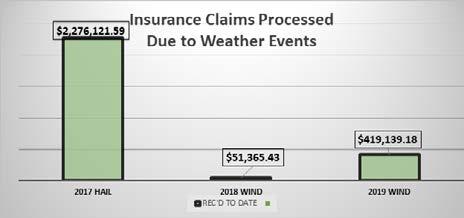
6 minute read
Municipal Court
City Manager: Joe Neeb Municipal Judge: Joe Seskey
Municipal Court Representing the Judicial Branch of the City of Roswell, Municipal Court is responsible for the adjudication of misdemeanor criminal offenses in violation of Municipal ordinances and traffic offenses adopted by the City from the New Mexico Uniform Traffic Code. The court hears cases initiated by Officers of the Roswell Police Department, Animal Services, and Code Enforcement.
Employees The Court is comprised of the Judge (elected by the Citizens), a court administrator, four deputy court clerks, a bailiff, and two court compliance officers. Employees, including the Judge attend professional development training throughout the year. The Municipal Judge attends yearly required training as mandated by the Supreme Court of New Mexico. Training is conducted through the University of New Mexico’s Judicial Education Center. The Court Administrator, Deputy Court Clerks and Bailiff are members of the New Mexico Municipal Court Clerks Association. In 2019, our Court Administrator Belinda Franco was selected to serve on the Education Committee of the Municipal Court Clerks Association.
Municipal Court Operations The budget of the Municipal Court is approved by City Council. The Municipal Judge has overall responsibility for the day to day operations of the Court and its employees. The Supreme Court of New Mexico has superintending authority over the Municipal Court and sets policy guidance and rules it must follow. Judgements and Decisions in Municipal Court may be appealed to District Court. The maximum sentence that a Municipal Judge may impose in a criminal offense in violation of City ordinance is 90 days in jail and a 500.00 fine. Penalties for traffic violations are approved by City Council adopted by ordinance. In 2019, a total of 1,586 violations of criminal ordinances were filed in Municipal Court. There were 3,266 violations of traffic ordinances filed. There were 181 parking tickets filed. In some instances, persons cited into Municipal Court fail to appear when required. This requires the Court to issue and mail a summons requesting their appearance by a certain date. If the defendant fails to appear after a summons has been issued, a warrant for their arrest may be initiated. Police Officers may also apply directly to the court for arrest warrants in criminal matters they have investigated. In 2019, the Court issued 1,736 warrants. Municipal Courts are authorized to perform Wedding Ceremonies. Municipal Court provides this service at no charge. There were 188 weddings performed in 2019.
Municipal Court
City Manager: Joe Neeb Municipal Judge: Joe Seskey
Fines and Fees Collected In many instances a fine is assessed as a result of a plea of guilty or after having been found guilty. Court cost are required to be assessed in all cases. In some cases, additional fees are assessed for Probation or House Arrest. The court collects these fines and fees at sentencing and for those defendants who cannot pay immediately they are afforded an option to pay over time through a payment plan option. There are further options for the defendant to convert their fines to community service if they have no ability to pay. In 2019, the court collected a total of $296,520.00 from all sources. Alternative Sentencing While a sentence to jail is an option the court may consider when sentencing defendants who have pled or been found guilty, the Roswell Municipal Court employs several alternative sentencing strategies in lieu of incarcerating defendants. Community Service, Probation and House Arrest are helpful in reducing recidivism and reducing cost to the City related to incarceration. Programs for first time and young offenders are often considered in an effort to correct behavior and deter defendants from making poor choices in the future. Court Compliance Officers are responsible for supervising defendants sentenced to Community Service, Probation and House Arrest. In 2019: • Compliance Officers monitored 513 Defendants participating in Community Service programs • Defendants completed a total of 8,498 hours of Community Service • Compliance Officers supervised 135 Defendants on Probation conditions imposed by the Court House Arrest is an option in lieu of serving time confined to the Chaves County Detention Center. It allows the defendant to have some flexibility to maintain employment and address the immediate needs of their personal or family obligations. Persons on House Arrest are monitored by an electronic device attached to their ankle and their location can be tracked at all times. • Compliance Officers monitored 127 Defendants confined to House Arrest as imposed by the Court • A total of 1,088 days were served by defendants on House Arrest in lieu of incarceration. Had these persons been incarcerated in the Chaves County Detention Center, the City would have incurred a cost of approximately $81,600.00. 2019 Municipal Court Highlights Approved legislation at the State and Local level require the constant evaluation of our internal processes and service delivery. The Supreme Court of New Mexico further provides updates and changes for the Courts to implement. These changes often require new forms to use or new procedures to be established. In early 2019, Municipal Court reviewed and upgraded the Pre-Trial release procedural forms and upgraded our communication equipment in support of video arraignments for incarcerated defendants. In August 2019, a comprehensive review of all systems and operations of the Court began with the goal of ensuring the Court is operating with best methods and practices and is compliant with New Mexico Supreme Court rules and policies. Through this review, several recommendations were made to improve internal processes and increase the Municipal
Court buildings safety and security. Several changes in the forms currently in use and updates to internal policy and procedures have begun and will continue into 2020. Notable changes include changing arraignment start times to 9:00 am as opposed to scattered arraignment times throughout the business day. This re-aligns the Court work flow and allows for better use of staff time. It further avoids redundancy and allows a better service delivery to defendants and users of the court. The court is making better use its software capabilities and has identified ways the software we currently use will enhance our operations. It has been a goal of the court to get to a paperless system. This has proven difficult due to many factors but it is still a goal we will strive for. Some recent training staff has received in the use of our software program has identified, specifically for our compliance officers, an ability to move more closely to a paperless system. We are pleased to announce that currently compliance officers are operating approximately 90 percent paperless. We continue to cultivate resources within the community that can benefit and help defendants and thus help the community as a whole. We have recently began working with the services of a Licensed Clinical Social Worker as an option for the Court to refer defendants for various counseling services when required. • Finalize contracting services with a local law firm to provide indigent representation • Increase training and professional development opportunities for the staff • Implement technology upgrades to improve notice to defendants of their Constitutional Rights • Expand Community Service opportunities within the Community
Municipal Court 2020 For 2020, the Municipal Court’s goals and objectives include: • Continue to assess operations to ensure rules compliance and best practices










